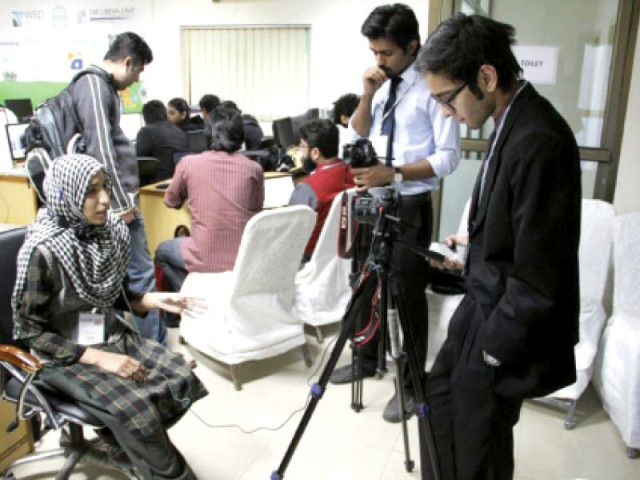Innovation and education: Young IT wizards tackle water and sanitation woes
Best low-cost tech solutions to be rewarded with World Bank contract.

Sumbal Zahra, a student of the Punjab University College of Information Technology, and four of her classmates are designing a website where Islamabad residents can learn their water and power cut schedules.
The website will be kept up to date through consultation with local water, power and development authorities. “Islamabad residents can simply go to the website and get their schedules. Or they can send an SMS to a number and they will get a message with the information,” she said.
Zahra and her classmates are one of 13 teams that will present projects today as part of the Water and Sanitation Hackathon. Some 130 students from IT colleges across Pakistan started coding their websites and mobile apps from Friday and had until 5pm on Sunday to finish them. Their challenge is to design software that will help resolve 13 sanitation problems in Pakistan.
The sanitation problems were identified in consultation with 60 organisations across Pakistan, including utility companies, local and provincial governments, and citizen groups between June 2012 and October 2012, said Anjum Rahman, communications consultant for the Water and Sanitation Programme of the World Bank, which is arranging the event.
On Sunday, the two teams with the best projects will be awarded contracts to work with the utilities concerned to implement their ideas over the next few years, said Rahman. She said that the projects that could have the greatest impact around the country would be selected.

Hammad Naeem, a student of Comsats Islamabad, is building a complaint registration system for the Water and Sanitation Agency. “Wasa has a single complaint landline and the complaints usually end with the operators, rarely reaching the top officials. We are designing a process whereby citizens can lodge complaints on the website.
The complaint will automatically be categorised and forwarded to the official concerned.
The official will, where possible, write down the solution as a note and publish it on the website, with pictures. The complainant can then give feedback by rating the solution,” said Naeem. “We are about 50 per cent finished,” he added.
group of students is working on developing an app that will inform residents of Hayatabad in Peshawar the price of drinking water delivered by tankers, so the drivers can’t overcharge them. Another is building an app that will allow residents to report directly to municipal authorities about street cleaning in their neighbourhood. A mobile app is being designed to help government utility centres locate the best shops and deals for hardware to install latrines in less-developed areas.
One team is building a database system through crowd sourcing about water and sanitation facilities available from all government and non-government organisations in Pakistan. Another aims to develop a mobile game raising awareness of the need for good sanitation and hygiene.
Rahman said that the organisers hoped that the event would raise awareness of sanitation and water issues, as well as foster innovative local solutions to difficult problems. “Instead of just complaining about the sanitation conditions, we are engaging students to become part of the solution,” she said.
Published in The Express Tribune, December 2nd, 2012.



















COMMENTS
Comments are moderated and generally will be posted if they are on-topic and not abusive.
For more information, please see our Comments FAQ